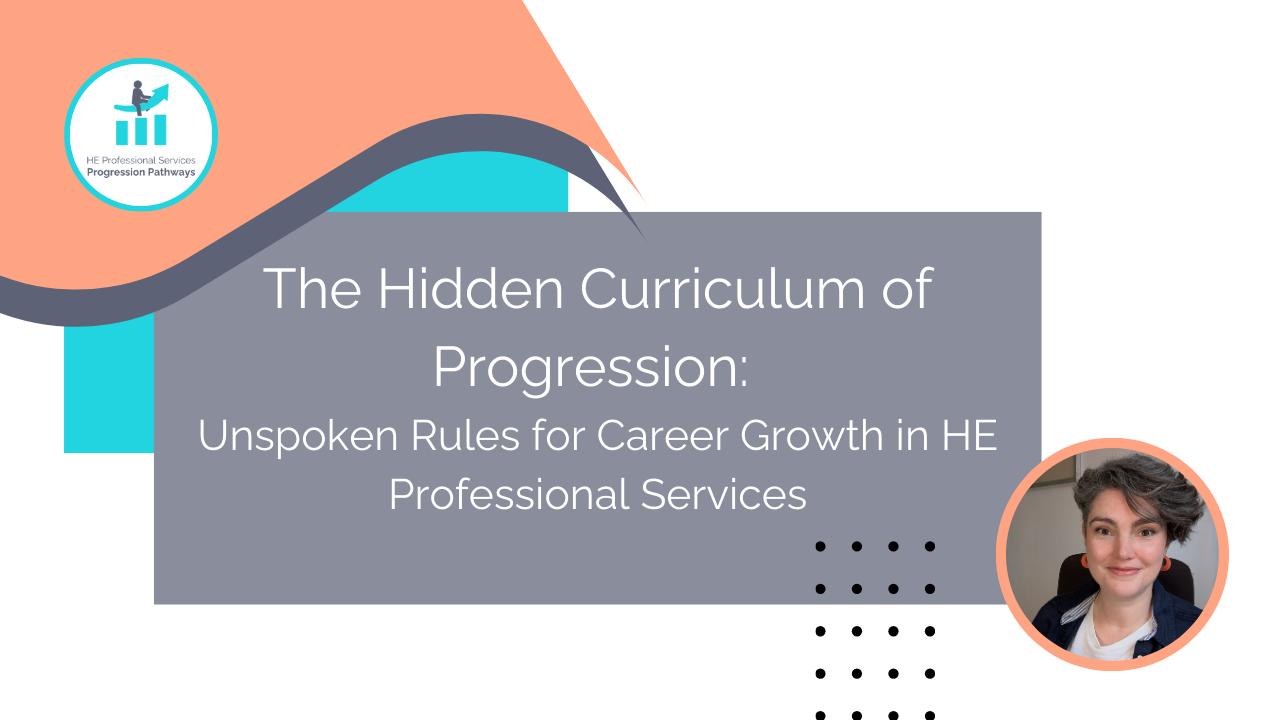The Hidden Curriculum of Progression: Unspoken Rules for Career Growth in HE Professional Services
Aug 26, 2025
If you're a Professional Services manager in UK Higher Education, you've probably noticed something frustrating: whilst academic colleagues have clear promotion pathways, your progression often feels like guesswork.
You might know that HERA defines the grades. You've read the job descriptions. But somewhere between Grade 6 and Grade 9, there's a gap. A set of unspoken expectations, behavioural shifts, and cultural competencies that no one explicitly teaches.
I call this The Hidden Curriculum of Progression, and understanding it is the difference between hoping for promotion and strategically preparing for it.
Why The Hidden Curriculum Exists
HERA was designed to help institutions grade roles consistently. It wasn't built to help you progress between those grades. The result? While the framework tells you what a Grade 8 role is worth, it doesn't tell you how to demonstrate Grade 8 readiness.
This leaves capable professionals stuck in limbo. They know they're ready for more responsibility but can't articulate exactly how they've evolved beyond their current grade.
The hidden curriculum fills this gap. It's the collection of implicit expectations that recruitment and promotion panels look for but rarely name: how your communication style should shift, what "strategic thinking" actually looks like in practice, and how influence changes as you move from managing tasks to shaping culture.
The Key Elements of The Hidden Curriculum
Career progression in HE Professional Services isn't just about doing your job well. It's about demonstrating readiness for the behavioural and mindset shifts required at the next level. Here are the core elements that matter most:
Communication That Commands Respect
Moving from clear explanation to influential persuasion. Grade 6s communicate confidently; Grade 8s communicate with authority that shapes outcomes.
Decision-Making Under Pressure
Progressing from sound operational judgement to high-stakes institutional decision-making where your choices have lasting impact.
Influence Without Authority
Evolving from peer persuasion to institutional influence: shaping direction through credibility, not just good ideas.
Strategic Leadership
The shift from understanding strategy to contributing to it, then eventually setting strategic direction for your area.
Handling Complexity
Moving from managing multiple priorities to navigating institutional complexity while providing clarity for others.
Building Authentic Credibility
Demonstrating not just competence, but the gravitas and professional presence expected at senior levels.
Emotional Intelligence
Developing the confidence, conviction, and courage to lead through uncertainty and have difficult conversations.
Political Awareness
Understanding how to navigate governance structures, contribute meaningfully to institutional decisions, and represent your service.
Cultural Intelligence
Knowing how to address tensions, manage sensitive situations, and champion inclusive practices with increasing sophistication.
Visibility and Positioning
Ensuring decision-makers can see you operating effectively at the level you're seeking to reach.
Why This Matters Now
The HE landscape is changing fast. Budgets are tighter, restructures more frequent, and the pressure to demonstrate value has never been higher. In this environment, Professional Services leaders who understand the hidden curriculum don't just survive. They thrive.
They know how to position themselves strategically, communicate with impact, and demonstrate the kind of institutional thinking that makes them indispensable.
More importantly, they don't wait for permission to progress. They understand exactly what's required and take deliberate action to develop it.
The Cost of Not Knowing
Without understanding the hidden curriculum, even highly capable professionals can find themselves:
- Passed over for roles they know they could do well
- Struggling to articulate their readiness in applications and interviews
- Feeling like they're "winging it" in senior conversations
- Wondering why their competence isn't translating into progression
The tragedy is that many of these professionals are already demonstrating elements of the hidden curriculum, they just don't know how to recognise, develop, or articulate it.
How to Navigate The Hidden Curriculum
Understanding the hidden curriculum starts with honest self-assessment. Where are you now? Where do you need to be? And what specific shifts in behaviour, thinking, or approach will bridge that gap? You can find the Grade Guide for your next grade here.
It's not about becoming a different person. It's about recognising the leadership qualities you already have and developing them with intention and strategy.
The progression from Grade 6 to Grade 9 isn't just about taking on more responsibility. It's about demonstrating increasingly sophisticated ways of thinking, communicating, and leading. Each grade step requires specific behavioural shifts that panels look for but rarely make explicit.
Your Next Steps
If you're ready to decode your own progression pathway, check out the Getting Ready for Your Next Grade programmes. These are 6-12 month cohort based programmes where we ...well, get you ready for either senior management (Grade 8/equivalent) or leadership (Grade 9/equivalent)
The hidden curriculum of progression isn't actually hidden. It's just not explicitly taught. But once you understand it, you can navigate it strategically, progress with confidence, and finally get the recognition your expertise deserves.
Ready to stop guessing and start progressing? Your next move is waiting.
Related articles:
- Communication in Higher Education: How Expectations Shift from Grade 6 to 9
- Decision-Making in Professional Services: What Panels Look for at Each Grade
- Influence Without Authority: Hidden Skills for Progression in HE
- Building Credibility in Professional Services: What "Readiness" Really Means - coming soon
